|
|
|
Sort Order |
|
|
|
Items / Page
|
|
|
|
|
|
|
| Srl | Item |
| 1 |
ID:
155502


|
|
|
|
|
| Summary/Abstract |
We explain why international development organizations have had so little success building and reforming public sector institutions in developing countries. They often fail despite their apparently strong commitment to achieving measurable results and extraordinary amounts of time, money, and effort. We demonstrate that, when donors and lenders make access to financing contingent upon achievement of performance targets, recipient countries tend to choose easy and shallow institutional targets. These targets measure the organization of public sector institutions, rather than their effectiveness at addressing public problems. Such targets provide countries with low-cost opportunities to signal commitment to institution-building to international development organizations. We demonstrate the explanatory and predictive power of our argument in the context of a sector of World Bank lending—environment and natural resource management—that focuses heavily on improving public sector institutions.
|
|
|
|
|
|
|
|
|
|
|
|
|
|
|
|
| 2 |
ID:
155497


|
|
|
|
|
| Summary/Abstract |
A state that enlists foreign fighters as extensions of its own military power confronts an acute principal-agent problem. While the state (principal) might benefit by delegating security responsibilities to foreigners (agents), it risks seeing its aims partially implemented, unfulfilled, or even subverted. For more than a century, the United States has attempted to mitigate this problem as it has raised, trained, and armed proxies to fight its small wars. But we find considerable variation in its approach across time and space. Why? Rationalist treatments of the agency problem face difficulty in accounting for this variation, as they focus on goal incongruity between the principal and agent. This downplays, if not ignores, the historical and social process that leads to different manifestations of goal incongruity. Thus, I propose a constructivist reworking of agency theory. I stress how the principal draws upon, and deploys, social knowledge to identify and manage the particular hazards that it believes its agent poses. Mining primary sources, I show that changing characterizations of local proxies—as either biologically or culturally flawed—led to different interpretations of the agency problem. In turn, this led American officials to adopt different approaches to mitigating it—ranging from outright paternalism to less direct tutelage.
|
|
|
|
|
|
|
|
|
|
|
|
|
|
|
|
| 3 |
ID:
155492


|
|
|
|
|
| Summary/Abstract |
Mindful of the growing interest in non-Western and pre-modern political systems, we propose a framework for the analysis of states, state systems, and international orders. We provide a culturally neutral definition of the state and outline a method for assessing variation in political organization both within and above the state. Our framework cleanly delineates hierarchy from anarchy and can be applied to a diverse set of state systems. We then show how the content of international order inter-relates with system structure and the local density (interaction capacity) of a region. We argue that our framework captures similarities—and exposes differences—between different systems and orders over time and space. It strikes a balance between the traditional focus on the Western experience and the current trend toward regional studies in which it is difficult to accumulate knowledge in a rigorous manner.
|
|
|
|
|
|
|
|
|
|
|
|
|
|
|
|
| 4 |
ID:
155488
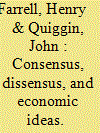

|
|
|
|
|
| Summary/Abstract |
During the recent economic crisis, Keynesian ideas about fiscal stimulus briefly seemed to form the basis of a new expert consensus about how to deal with demand shocks. However, this apparent consensus soon collapsed into a continuing dissensus, with important consequences for policy. Neither conventional bargaining accounts nor existing theories of the role of ideas in policy outcomes easily explain the arc of international responses to the Great Recession. In this article, we propose that sociological arguments about professions, in conjunction with those about spaces of political contention as ecologies, provide a better understanding of the puzzle of Keynesianism’s rise and decline. The internal dynamics of prestige and status within the profession of economics intersected with policy arguments between states so as to make macroeconomic policy a “hinge” issue, over which coalitions in both ecologies contended. This explains how Keynesian economists and political actors worked together in the first phase of the crisis to advocate for and implement fiscal stimulus. It also explains why aggrieved policy actors, who did not favor stimulus, could help disrupt the apparent consensus in the second phase of the crisis by promoting the views of dissident economists.
|
|
|
|
|
|
|
|
|
|
|
|
|
|
|
|
| 5 |
ID:
155494


|
|
|
|
|
| Summary/Abstract |
On the eve of the Meiji Restoration in 1868, the nearly 300 semi-autonomous domains across Japan had widely varying tax rates. Some handed over 70 percent of their rice yield to the samurai ruler of the domain, while others provided 15 percent. This variation existed in spite of the similar fiscal demands that the domain rulers faced within the Tokugawa regime—the feudal system that governed Japan between 1603 and 1868. This period was remarkably stable; Japan saw no foreign or domestic wars. This allows us to focus on the impact of pressure from below on taxation. We study the extent to which peasant-led rebellions and collective desertion (“flight”) lowered the subsequent tax rate imposed by samurai rulers. Using newly compiled data on different types of peasant-led political mobilization—from petitions to insurrections—we find an association between, on the one hand, large-scale rebellions and flight and, on the other, lower tax rates. We interpret the results as evidence of rebellious or mobile peasants’ ability to constrain their rulers; the more complacent fail to win concessions. Our findings suggest that peasant mobilization played a role in restricting state growth in early modern Japan through tax concessions.
|
|
|
|
|
|
|
|
|
|
|
|
|
|
|
|
| 6 |
ID:
155493
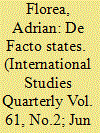

|
|
|
|
|
| Summary/Abstract |
De facto states—polities, such as Abkhazia (Georgia) or the Donetsk People’s Republic (Ukraine), that appropriate many trappings of statehood without securing the status of full states—have been a constant presence in the postwar international order. Some de facto states, such as Northern Cyprus, survive for a long period of time. Others, including Tamil Eelam in Sri Lanka, are forcefully reintegrated into their parent states. Still others, such as Aceh in Indonesia, disappear as a result of peacemaking. A few, such as Eritrea, successfully transition to full statehood. What explains these very different outcomes? I argue that four factors account for much of this variation: the extent of military assistance that separatists receive from outside actors, the governance activities conducted by separatist insurgents, the fragmentation of the rebel movement, and the influence of government veto players. My analysis relies on an original dataset that includes all breakaway enclaves from 1945 to 2011. The findings enhance our understanding of separatist institutional outcomes, rebel governance, and the conditions that sustain nonstate territorial actors.
|
|
|
|
|
|
|
|
|
|
|
|
|
|
|
|
| 7 |
ID:
155500


|
|
|
|
|
| Summary/Abstract |
Americans think the US foreign aid budget is far too generous. Can information change those views? We identified ten prominent arguments about aid in public discussion, five positive and five negative. In a survey experiment, we exposed respondents to one of those arguments with five associated facts. Most of the arguments in favor of aid made respondents more supportive, while most of the arguments against aid made them less supportive. Arguments that focused either positively or negatively on economic development in recipient countries or advancing US interests made little difference. In contrast, arguments about the domestic costs of foreign aid or those that invoked moral considerations like recipient need or corruption had fairly large effects on attitudes. The most successful argument, on the low cost of aid, reduced aid opposition from 67 to 28 percent. When respondents saw both pro and con arguments together, however, arguments generally lost their efficacy. The only exception was the argument about the low cost of aid, which altered opinions in some ways—even when countered with anti-aid arguments. Our results are somewhat surprising given the conventional wisdom that people are motivated reasoners who reject new information that does not conform to their worldview.
|
|
|
|
|
|
|
|
|
|
|
|
|
|
|
|
| 8 |
ID:
155495
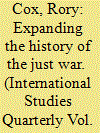

|
|
|
|
|
| Summary/Abstract |
This article expands our understanding of the historical development of just war thought by offering the first detailed analysis of the ethics of war in ancient Egypt. It revises the standard history of the just war tradition by demonstrating that just war thought developed beyond the boundaries of Europe and existed many centuries earlier than the advent of Christianity or even the emergence of Greco-Roman doctrine. It also argues that the creation of a prepotent ius ad bellum doctrine in ancient Egypt—based on universal and absolutist claims to justice—hindered the development of ius in bello norms in Egyptian warfare. I contend that this development prefigures similar developments in certain later Western and Near Eastern doctrines of just war and holy war.
|
|
|
|
|
|
|
|
|
|
|
|
|
|
|
|
| 9 |
ID:
155490
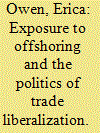

|
|
|
|
|
| Summary/Abstract |
The movement of jobs overseas—known as “offshoring”—is one of the most politically charged aspects of globalization in developed countries. The high salience of offshoring reflects growth in competitive pressures from globalization that directly target individuals’ jobs. I argue that, in a world of fragmented production, how vulnerable one’s occupation is to offshoring helps explain patterns of protectionist sentiment not otherwise accounted for by existing work. I expect that the negative consequences of offshoring for workers will be particularly salient. As a result, vulnerability to offshoring is likely to generate protectionist sentiment toward free trade among constituents. Therefore, legislators whose constituents are vulnerable to offshoring should prove more likely to oppose trade liberalization. I measure vulnerability to offshoring at the district level using data from the US Census. I analyze roll call votes on free trade in the House of Representatives between 2001 and 2006. I find that the larger the share of their constituents who are vulnerable to offshoring, the more likely legislators are to vote against free trade and to discuss the costs of trade for workers in floor debates. My results suggest that the dynamics of offshoring constitute an overlooked dimension to the political economy of trade.
|
|
|
|
|
|
|
|
|
|
|
|
|
|
|
|
| 10 |
ID:
155485


|
|
|
|
|
| Summary/Abstract |
Global production is increasingly organized through supply chains made up of firms that specialize in specific stages of production. This raises an important question: how does firms’ participation in global supply chains affect their trade preferences? Research shows that multinational corporations (MNCs) tend to prefer open trade, while domestic import-competing firms favor trade protection. We argue that the globalization of production also leads vertically specialized firms—those specializing in specific stages of the production process—to support open trade. Using firm-level data from the solar photovoltaics industry, we show that vertically specialized firms prefer open trade if they have ties to global supply chains. We present evidence that three sets of vertically specialized firms tend to favor open trade: upstream suppliers of inputs to a global supply chain, global manufacturers that import inputs, and downstream users of final products. Our findings suggest that the rise of global value chains shifts the politics of globalization: it expands firm coalitions in favor of open trade. Our findings also matter for an important public-policy concern: climate change. Governments face cross-cutting demands from solar firms over trade policy, dividing the growth coalition supporting clean energy technologies.
|
|
|
|
|
|
|
|
|
|
|
|
|
|
|
|
| 11 |
ID:
155501
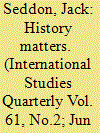

|
|
|
|
|
| Summary/Abstract |
A central point of disagreement animates global governance research. Some scholars see changing forms of global governance as eroding the power of the state. Others reject this claim, arguing that relative state power remains the most important factor in international affairs. I contend that analytical misconception confounds and misleads this debate. Both sides insist on modeling the state as a unitary actor; further, both neglect the temporal dynamics of international regime formation. I build an analytical framework that focuses on political processes that unfold over time and opens up the unitary state. Probing three decades of innovation in global finance, trade, and environmental governance, I find no evidence of a zero-sum relationship. In fact, experimental forms of transnational governance often empower governmental actors and state agencies. However, I also conclude that relative organizational power grounded in historical processes of regime formation matters more than relative state power in shaping global regulatory change.
|
|
|
|
|
|
|
|
|
|
|
|
|
|
|
|
| 12 |
ID:
155499


|
|
|
|
|
| Summary/Abstract |
When and how do elite messages shape mass opinion on international issues? Do informational or partisan components of elite cues dominate? Recent survey experiments offer conflicting insights. We argue that issue context matters, and that the single-issue nature of most survey experiments masks systematic variation in how elite cues affect attitudes across international issues. These effects depend on the baseline distribution of mass opinion on the issues themselves. Two characteristics of underlying opinion prove crucial: first, the share of those not aligned with expert opinion, and second, the degree of partisan polarization. Where polarization is limited, information effects should dominate. Where issues are polarized, information intake should be limited by partisan attribution. We test these hypotheses using nine survey experiments across a range of issues, including the rise of China, climate change, international institutions, and the use of force. At one extreme, all messages—even those endorsed by generic or opposition experts—can shift opinion; at the other, only partisan-attributed messages matter. Our findings are important not only for understanding public opinion about international issues but also for those interested in mobilizing opinion in a democratic setting.
|
|
|
|
|
|
|
|
|
|
|
|
|
|
|
|
| 13 |
ID:
155487
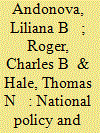

|
|
|
|
|
| Summary/Abstract |
Many scholars and policymakers see transnational governance as a substitute for lackluster national and international policies, particularly in the context of intergovernmental gridlock or limited state capacity. The bulk of the literature explains sub- and non-state actors’ participation in transnational initiatives as a product of, on the one hand, micro-level incentives and, on the other, diffusion processes that create and spread normative and market-based pressures. We argue that such theoretical perspectives overlook the dynamic relationship between national policies and transnational governance. First, we argue that ambitious national policies positively affect sub- and non-state actors’ participation in transnational governance. Second, we posit that domestic institutions condition the effects of micro-level incentives and transnational pressures on participation in transnational governance. We test these claims in the climate regime, using an original dataset that, for the first time, measures cross-national participation in transnational climate initiatives across jurisdictions. The results support our expectations. They therefore suggest that we should understand national policies and transnational governance as complements, rather than competitors, to one another. Finally, by showing how and when national policies affect participation in transnational initiatives, we identify important scope conditions for their significance in addressing climate change.
|
|
|
|
|
|
|
|
|
|
|
|
|
|
|
|
| 14 |
ID:
155489


|
|
|
|
|
| Summary/Abstract |
The outcomes of international negotiations cannot be understood without considering how participants behave strategically. But how do “rules of the game” in negotiations—and the uncertainty that often surrounds them—shape this behavior? I examine the 2002–2007 period of the negotiations of Economic Partnership Agreements (EPAs) between the European Union and West Africa. I argue that both sides made misguided strategic choices. Their misperceptions of the rules operative in trade negotiations with a “development dimension” facilitated the emergence of an impasse during the 2002–2007 negotiating period of the EPA process. In order to explain why, we should conceive of bargaining processes as spaces defined by unstable and potentially contested rules. I offer three mechanisms —payoff disjuncture, choice-range disjuncture, and style disjuncture—that help account for how misperceptions of these socially constructed rules can prevent, or at least delay, cooperation. My approach complements rationalist theories that rely on the insights of game theory with a constructivist perspective that brings to light the socially constructed nature of negotiation processes.
|
|
|
|
|
|
|
|
|
|
|
|
|
|
|
|
| 15 |
ID:
155486


|
|
|
|
|
| Summary/Abstract |
Most studies of policy interdependence try to observe international policy networks by focusing on the diffusion of a specific policy across countries. Thus, if that policy is not adopted from one country to the next, researchers usually treat that as a sign of weak interdependence and the lack of diffusion. In this article, we challenge the notion that diffusion processes and interdependence entail the same policy diffusing. National governments usually engage in a bundle of diffusing policies at the same time. We argue that they are often pressed to implement the policy adopted in neighboring countries. But, at the same time, their incentive to implement this policy depends, at least in part, on how much they rely on foreign resources. The greater their dependence, the more likely they are to adopt the policy preferences of foreign constituents. Thus, conditional on a neighbor’s pressure to adopt a policy, states may engage in policy alteration—the adoption of an alternative instrument to an internationally diffusing policy. We claim that such policy substitution is especially likely in countries that are less dependent on economic flows, as their governments enjoy more political leeway to turn policy diffusion processes to their advantage. We trace this mechanism using two studies of the diffusion of alternative environmental policies across space and time.
|
|
|
|
|
|
|
|
|
|
|
|
|
|
|
|
| 16 |
ID:
155498


|
|
|
|
|
| Summary/Abstract |
How does the United States build multilateral military coalitions? Conventional wisdom focuses on the role of formal alliance structures. Allies band together because they share threat perceptions, political ideology, norms, and values. I argue instead that US-led coalition-building efforts are influenced by the entirety of bilateral and multilateral ties that connects the United States with a third party. The breadth of institutions matters because it allows officials to gather information on the potential coalition partner’s deployment preferences beyond straightforward security considerations—such as what kind of economic and political considerations affect its willingness to join the coalition. Diplomatic embeddedness also helps American officials identify linkages between military and non-military interests. This facilitates the construction of side-payments. I find evidence for my argument by using an original dataset including all US-led multilateral coalitions in the pre– and post–Cold War era. I complement the quantitative analysis with a case study on US coalition-building efforts for the Korean War.
|
|
|
|
|
|
|
|
|
|
|
|
|
|
|
|
| 17 |
ID:
155496
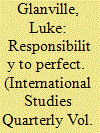

|
|
|
|
|
| Summary/Abstract |
Mounting evidence suggests that non-consensual military intervention is most often a poor instrument for alleviating mass suffering. Thus, a growing number of scholars and practitioners argue that the international toolbox for protecting populations should also contain non-coercive tools for assisting states and enhancing their capacities. But while studies of the history of military intervention proliferate, past thinking about duties of assistance and capacity-building remains relatively neglected. This article seeks to rectify this state of affairs by analyzing and seeking insights from the detailed treatment of non-coercive means of discharging duties to others offered by the eighteenth-century Swiss jurist and diplomat Emer de Vattel. Drawing on Leibniz’s conception of “perfection,” Vattel argued that states have duties to contribute to the perfection of those beyond their borders insofar as they can without doing an “essential injury” to themselves. While some of his claims about duties may be uncontroversial today, others remain subject to ongoing contestation, and still others have been forgotten and demand renewed attention. Crucially, while Vattel acknowledged the need for prudence, he also demanded that states be willing to make sacrifices for the sake of vulnerable strangers. He framed the cultivation of ever greater ability to assist others as a fundamental aspect of a state’s own self-perfection.
|
|
|
|
|
|
|
|
|
|
|
|
|
|
|
|
| 18 |
ID:
155491


|
|
|
|
|
| Summary/Abstract |
Transnational crime brings substantial foreign capital into a number of fragile and developing states. Yet the economic and political impacts of such capital have rarely been studied, due to the challenges of obtaining accurate data on illicit activities. We overcome this challenge by compiling a dataset on the amount and disbursement dates of ransom payments made by ship owners and insurers to Somali pirates from 2005 to 2012, along with sub-national commodity prices and trade flows in Somalia. Using a difference-in-differences strategy, we find that ransoms have effects similar to those associated with the Dutch Disease. These effects include appreciating the local currency, decreasing export competitiveness, and increasing import dependence. Our results illuminate a new and distinct channel through which illicit capital can undermine long-term economic development and foster an economic and political dependency on illicit sectors.
|
|
|
|
|
|
|
|
|
|
|
|
|
|
|
|
|
|
|
|
|